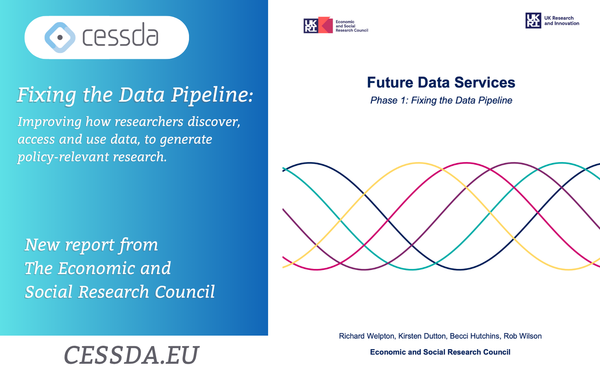
ESRC Report Sets Out Vision to Fix the UK’s Research Data Pipeline
The Economic and Social Research Council (ESRC) has published Future Data Services Phase 1: Fixing the Data Pipeline, the first step in a major effort to improve how researchers across the UK access and use data.
The report responds to long-standing challenges voiced by the research community — from confusing data catalogues to slow, complex access procedures — and lays out a roadmap for building a more connected, user-centred and “federated” landscape of data services.
New guiding principles
The Future Data Services (FDS) review began in 2021 to understand how ESRC-funded data services could better support researchers. Through workshops, interviews, and consultations with over 100 stakeholders, the review explored barriers to accessing data and opportunities to modernise the UK’s data infrastructure.
The report envisions a seamless system where data discovery, access and support are joined up across infrastructures. It proposes a cultural shift in how data services are designed and delivered: one centred on co-design with researchers, collaboration across organisations, investment in skilled staff, and greater engagement with the public.
Five guiding principles underpin this vision:
-
Co-design with researchers by default.
-
Co-deliver services across infrastructures.
-
Invest in people and data expertise.
-
Shift the culture toward enabling better research.
-
Talk to the public confidently about the value of data.
Key findings and recommendations
The report highlights four critical areas:
-
Data Discovery and Curation: Too many inconsistent data catalogues confuse users. ESRC recommends integrating discovery tools and improving metadata quality.
-
Data Access: Researchers face delays and duplication in applying for data. The report calls for simpler, standardised procedures and better support across trusted research environments.
-
People, Organisations and Culture: Recruiting and retaining skilled staff is a major challenge. ESRC urges stronger career development pathways and people-focused strategies.
-
Public Engagement: Greater openness is needed to build public trust in data use.
The recommendations will feed into the next stage of ESRC’s work, including a detailed roadmap for implementation and new funding opportunities to help services co-design and co-deliver more efficient systems.
Professor Alison Park, Interim Executive Chair of ESRC, said:
"ESRC’s data services play a vital role in helping researchers discover, access and make the most of the rich sources of data available in the UK. This first phase of our Future Data Services programme highlights innovative ways in which data services can be enhanced, including developing and applying new technologies such as AI, and supporting staff who deliver these services. We are providing a blueprint that will enable ESRC data service infrastructures to continue to evolve and support our research community to generate impactful, highly policy-relevant, evidence."